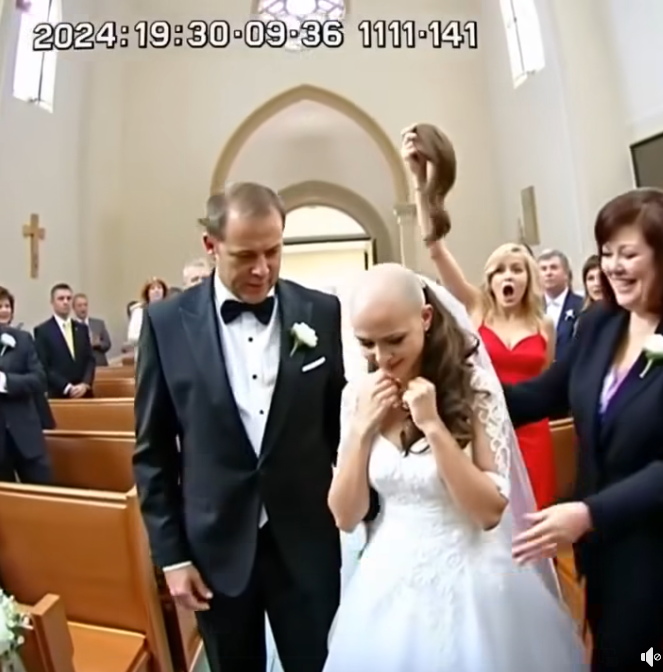The day had started like any other wedding day—bright, hopeful, and filled with anticipation. I had dreamed of this moment for months, imagining walking down the aisle in a beautiful dress, surrounded by loved ones, ready to marry the man I cherished.
But nothing could have prepared me for what awaited me inside the church.
As I stepped into the grand hall, I felt every eye on me—not the loving gaze I had imagined, but one that burned with judgment, mockery, and cruel amusement.
I was bald. The chemotherapy had taken my hair, a symbol of the battle I had fought quietly, day after day, for months.
My mother-in-law, the woman who was meant to celebrate my union, had turned my vulnerability into a spectacle.
Laughter echoed in the pews. Sharp, cruel, pointed. Every chuckle felt like a dagger slicing through my confidence.
My heart raced. My hands trembled. My knees threatened to buckle beneath me.
I wanted to disappear, to sink into the floor, to vanish from everyone’s eyes.
But then, something unexpected happened.
One of my friends, someone I had trusted and loved for years, stood up from her seat.
Slowly, deliberately, she removed her wig. Her bald head gleamed under the soft church lights.
She walked toward me with steady, unwavering steps, her eyes locked on mine.
And in that moment, a spark ignited inside me—a spark I hadn’t realized I had been missing.
Another woman followed, removing her wig with a gentle, purposeful grace.
And another. And then another.
In minutes, the entire church seemed to transform. The judgmental stares softened, replaced by faces of solidarity, courage, and understanding.
The women surrounding me revealed their own battles—scars, hair lost to treatments, stories of survival that mirrored my own.
It was as if shame had been replaced by a collective strength, a shared humanity that bound us together.
I felt my heart expand with gratitude and awe. I was no longer alone.
Even my mother-in-law, the source of my humiliation, was caught off guard.
Her mouth opened, words forming but never finding release. She had not anticipated courage so raw, so authentic, so undeniable.
I could see the tension in her eyes, the flicker of guilt and fear she could not mask.
For a moment, the entire church was silent, the atmosphere heavy with the weight of truth and revelation.
I remembered the countless nights I had cried alone, the private moments of despair, the mirror reflecting a face I barely recognized.
Yet now, surrounded by bravery, I felt a transformation occurring—not just externally, but deep within my spirit.
My bald head, once a source of shame, became a crown of resilience.
Every wrinkle, every scar, every mark on my body told a story of survival, courage, and unwavering strength.
I lifted my chin and walked down the aisle with the confidence I had once thought lost forever.
My groom, my beloved, stood at the altar, eyes shimmering with pride and love, oblivious to the cruelty around him.
He took my hands in his, grounding me, reminding me that love is not just about appearance, but about truth, trust, and connection.
The laughter that had been meant to destroy me had instead revealed the depth of human compassion.
Each supportive glance, each quiet gesture of courage from the women around me, reinforced my understanding that beauty and bravery are inseparable.
Even my mother-in-law, finally finding her voice, spoke through tears. She admitted that her cruelty had come from fear—a fear of change, of vulnerability, of confronting her own insecurities.
Her words did not undo the pain, but they added a layer of understanding, a bridge toward healing that I had not expected.
The ceremony continued, every vow, every whispered promise, every shared smile carrying the weight of victory over fear.
I realized then that marriage is not just a union of two people, but a space where courage, forgiveness, and empathy can flourish.
After the ceremony, as we moved into the reception, I noticed something remarkable.
The women who had stood with me before the altar now moved around me, their confidence and bravery reflected in every gesture.
Their actions had transformed a moment of intended shame into a powerful declaration: strength, dignity, and love always rise above cruelty.
That day, I did not just marry the man I loved. I married into a family that learned compassion, into a community that discovered what real beauty looks like. My bald head became my crown, forgiveness became my victory, and I walked forward knowing that what was meant to destroy me had instead made me unstoppable.
